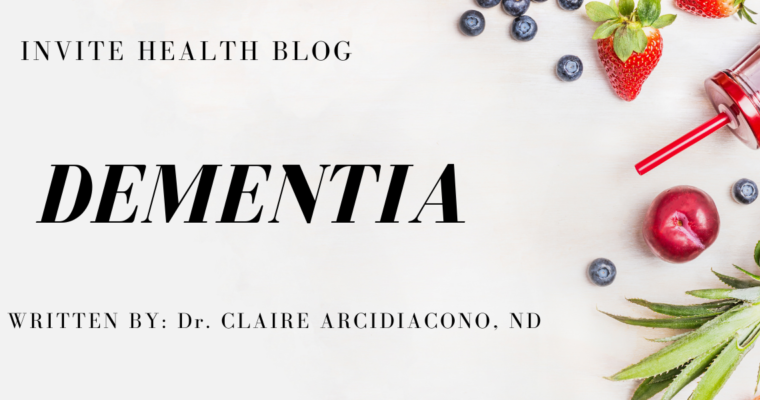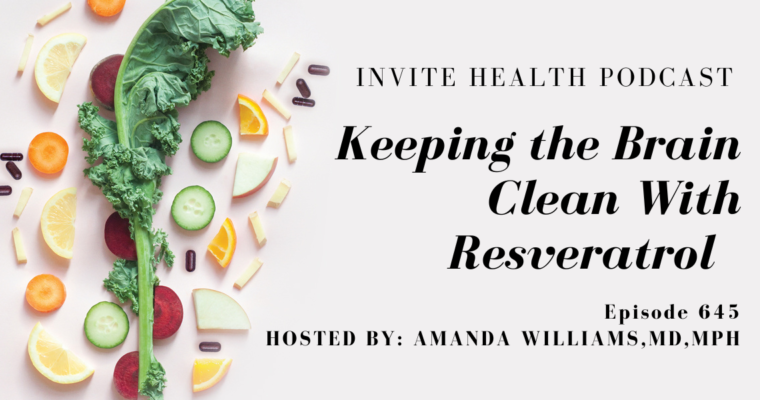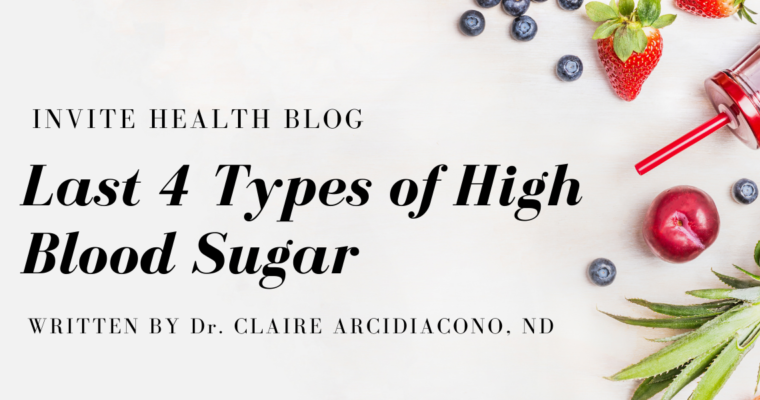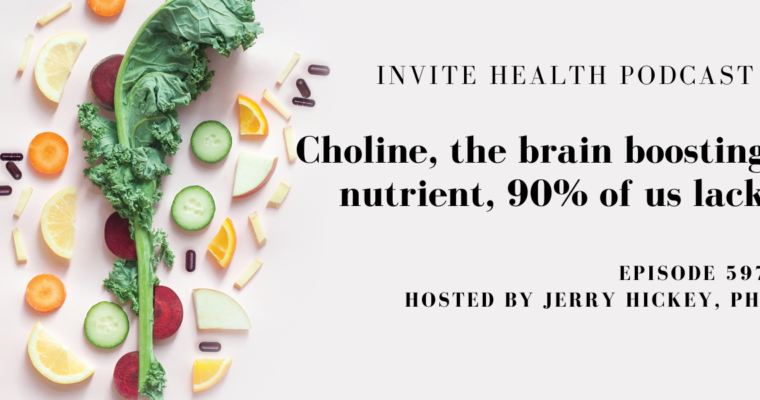Subscribe Today!
Please see below for a complete transcript of this episode.
TAKE THESE SUPPLEMENTS FOR YOUR MEMORY- PART 1. INVITEⓇ HEALTH PODCAST, EPISODE 630
Hosted by Jerry Hickey, Ph.

*Intro Music*
InViteⓇ Health Podcast Intro: [00:00:04] Welcome to the Invite Health podcast, where our degreed health care professionals are excited to offer you the most important health and wellness information you need to make informed choices about your health. You can learn more about the products discussed in each of these episodes and all that Invite Health has to offer at www.invitehealth.com/podcast. First time customers can use promo code podcast at checkout for an additional 15% off your first purchase. Let’s get started. † [00:00:34]
*Intro Music*
Jerry Hickey, Ph: [00:00:41] Alzheimer’s is a scary topic and memory loss, that’s a little bit scary, too. But there are different levels of memory loss, so just a quick review. There are people with perfectly healthy brains into deep old age, we’ll discuss that. And then there’s people with subjective memory loss where they feel they’re forgetting things a little bit, this is normal, it’s not a disease. It can happen to anybody as we age. But other people will say to these people subject to memory loss, oh, you’re fine, you don’t have any issue. Okay, that’s subjective memory loss. You’re forgetting a word here or there. Maybe you’re forgetting what you were talking about at the end of a sentence and not a big deal. Then, there is mild cognitive impairment, which they call a prodromal stage before Alzheimer’s. In other words, these people are pretty much headed for Alzheimer’s. And there is evidence that you can keep these people in this state for much longer and help prevent them from progressing into full blown Alzheimer’s. And then, of course, there’s Alzheimer’s disease, which is the lion’s share of all cases of dementia, where people really lose their memory functions. And that’s a terrible thing, and so far, there’s no cure. There were things that do help these people to a degree, especially in the beginning to mid-stages of Alzheimer’s, I’ll go over that a bit also. So welcome to my episode, take these supplements for your memory because we’re going to review some supplements that have really good data behind them. And I mean a big volume of data. Not one study, not two studies, not ten studies, many, many studies. We’re going to review these over the course of this episode and more. We’ll review other things that are good for your memory and things that are bad for your memory also. Hi, my name is Jerry Hickey, I’m a nutritional pharmacist, I’m also the senior scientific officer over at Invite Health. Welcome to my episode. You can find all of the Invite podcast episodes for free wherever you listen to podcasts or just go to our own website, invitehealth.com/podcast. You can also listen to Invite on Facebook, Instagram and Twitter at Invite Health. You can listen, you can watch it, and all of the information on this episode will be listed in the episode description. So let me keep going. † [00:03:05]
[00:03:06] There’s more and more evidence accruing, and its really sensational evidence that certain B vitamins and vitamin D and coenzyme Q10 are all really good for your brain. And by the way, many of these are good for your heart also. So, there’s a number of reasons to take these, and there’s new data, really interesting data where the actual doctors involved in the study and the researchers, there’s different different academic research institutions and hospitals and clinics throughout China, they recommend taking these supplements on a daily basis, and this is to help lower your risk of cognitive decline and also of dementia of Alzheimer’s disease. So, in this new study, its people included who were 50 years of age or older and they were split into four categories, those with normal memories. So, I mean, I would be in that category, I would hope, those with subjective memory loss, you know, and this is really important to me, just like it’s important that anybody who’s listening to the to this podcast episode. I turned 69 recently and my wife is not far behind me. So, it’s something, you know, you don’t worry about it, you don’t you’re not afraid of it, but you’d rather not have it. So, you do things to prevent it, right? You live a good life, you live your life, but you try to live a good, clean, healthy life. So, these are people over the age of 50 split into four categories, normal memory, that would include me and my wife, my wife and I, I should say, people with subjective memory loss. So, they’re noticing that they’re forgetting words here and there or maybe they’re not keeping track of their conversations as well as they used to, but they’re still fine. I mean, that’s very normal. That’s very normal to have some forgetfulness, some absent mindedness with age. That’s not Alzheimer’s, it’s not, okay. But then there is the condition, mild cognitive impairment. If you truly have mild cognitive impairment, because some things can disguise themselves as mild cognitive impairment. But if you truly have mild cognitive impairment, where you really you could still live at home and get things done, but you’re on the way to true memory loss and you’re on the way to Alzheimer’s disease. Most of these people will develop Alzheimer’s disease, full blown Alzheimer’s disease. It’s only a matter of time. But like I said, there were things that do push back on that. And when I say there were things that masquerade as mild cognitive impairment, sometimes when people are put in nursing homes, they’re in bed and they are losing track of day and night and all, and they might be on six drugs, five of them might affect the brain like sedatives to calm them down and hypnotics to make them sleep and things for allergies and all these different medications. It can look like Alzheimer’s. It can look like mild cognitive impairment. I actually had a condition like this. My wife, her mother had to be put in an assisted living home, there were real reasons. And my wife suddenly said, you know, they’re diagnosing her with dementia. And I go, that’s impossible, she didn’t have it yesterday, yesterday, meaning like six months before. I said, it can’t happen this quickly. I said, you know, show me the drugs. So, she was on like a bunch of drugs, certain drugs for her blood pressure, certain drugs for incontinence and drugs to help her sleep and drugs to calm her down. All of these things that make you like a zombie. So, I spoke to my wife, and I said have the doctor take her off like these medications, they are really not necessary, she could do fine without them. And miracle of miracles, her memory came back. She did not have, in fact, she was very sharp. She did not have Alzheimer’s; she did not have any form of dementia. But she did die from other reasons, sadly. Wonderful lady, Louise Bashur, who actually won the pie crust baking contest for all of Vermont. Not exactly healthy, but certainly delicious. So, in any event, they had all kinds of data on these four groups, like the people with normal memory, people with some memory loss, people with real memory loss. They had demographic data and data about, you know, where they lived, you know, like how much pollution, and they had info on their clinical condition. Did they have diseases? Were they taking drugs? Did they have injuries? Do they smoke? Do they drink? What medications are they using? Or if they’re not using medication at all, do they exercise? What did they eat? Do they drink alcohol and how much alcohol? They also gave them current physical; they gave them lab exams. And they found that certain vitamins really made a difference. They found those with a good intake of certain B vitamins. It was truly associated with better cognitive reserve. Okay, that’s an important topic cognitive reserve is having, you know what? I was hoping to make this into 20 minutes. I know that’s not happening, so I probably will have to do this podcast in two or three parts, but it’s an important topic. † [00:08:21]
PHOSPHATIDYLSERINE FOR MEMORY AND BRAIN HEALTH – INVITE HEALTH PODCAST, EPISODE 329.>>LISTEN NOW!
[00:08:23] Cognitive reserve means that you’ve created new memory cells, new memory tissue, and it hasn’t been touched by the plaques and the damage you see in Alzheimer’s disease or in depression. And this occurs mostly at night when you go into deep sleep, you release certain growth factors like nerve growth factors and brain derived neurotrophic factor. And these take your stem cells, your progenitor cells, and convert them into neurons for memory. And a young, healthy person can create like 600, 700 new memory cells every night. If they sleep enough, older people, it slows down. But I’m going to give you some tips throughout the program, how you can improve cognitive reserve, the creation of memory cells, as is something you could do it right up until, right up until you hit the wall. You could always, there was a nun study, this is important, I’ll do it real quick. There was a nun study done in the Southwest in the 1990s, something like 100 Catholic nuns. And they found that although some of the nuns had the plaques and damage in the brain that should have caused Alzheimer’s, these nuns went on functioning because they had a great deal of cognitive reserve. So why did they have cognitive reserve? They ate really good, healthy, wholesome foods like whole grains and fruits and vegetables. They weren’t drinking alcohol, they weren’t smoking. They were, they were physically active, like gardening and doing all kinds of volunteer work, etc., deep into old age. So, they were getting that. And also, socially they were hanging out with all the nuns, etc. and this kept them going because all of these things are important to keep the brain functioning. So that was the first time where I saw evidence for cognitive reserve helping prevent the symptoms of Alzheimer’s disease. So even though they had the plaques in their brain, their brain went on functioning, they could still stay in their convent and stay with the other nuns and function as they did before. So, in this study, they found that the intake of folate, that’s a B vitamin, vitamin B6 and vitamin B12, truly associated with better cognitive reserve, with less inflammation in the brain and increased antioxidant activity in the brain, that’s really important. Antioxidant activity declines in the brain when. So, I’m going to go off on a tangent here again or a little bit of a dogleg because it’s important to understand these concepts. † [00:10:46]
[00:10:48] Antioxidants prevent free radicals from occurring. So that’s very important in a high energy organ like your brain. Your brain is a super high energy organ because when the brain uses sugar and oxygen for energy, there’s always a little leakage from the power plants. They’re very well-developed, they’re called mitochondria. The brain has trillions of them, when they use sugar and oxygen for energy, they make molecules out of that, that they don’t want to make, but that are toxic. They’re called free radicals, and these things can kill brain cells. And there’s always a little bit of leakage, out of these mitochondria that can kill the brain cells and antioxidants snuff these free radicals out there. The antidote, things like vitamin C, and natural vitamin E, vitamin C could be synthetic, same chemical structure. Vitamin E has to be natural for it to work. You want natural vitamin E, so make sure your vitamin E is always natural. So, things like that protect the brain, the antioxidant protect the brain. The problem is a key antioxidant in a brain, superoxide dismutase type one and three declines with age. So, you kind of need to make up for that. So I’m going to show you some ways how. One of the ways is by taking these B vitamins because they were restoring antioxidant functions in the brain and this in turn reduced inflammation in the brain, which would gum up the workings of the brain and also destroy brain tissue killing brain cells. But here’s the thing, there was a group of these people who already had mild cognitive impairment, which I mentioned is kind of like key to going into Alzheimer’s disease. Daily doses of vitamin D reduced the risk of floating into true Alzheimer’s disease, of developing Alzheimer’s disease. Now in those with healthy brains, those with healthy brains, the B vitamins, vitamin D and a vitamin called Coenzyme, well, it’s not a vitamin, it’s a cofactor. Coenzyme Q10 kept their memory working, was preventing them from developing cognitive decline, was preventing them from going into my cognitive impairment and Alzheimer’s disease. So, vitamin D, you know about, the B vitamins we already discussed. † [00:12:52]
[00:12:53] So what’s coenzyme Q10? Coenzyme Q10 is a cofactor in the formation of energy. For you to convert sugar into energy, you need coenzyme Q10. It also helps clear to free radicals out of your cells, deep in your cells, it gets into the deepest part of your cells and your brain and your heart, etc. and cleans them out, so it’s a good supplement. Thing is that older people really need a form called Ubiquinol because it gets hard for them. The regular CoQ10 you get in the store, it’s harder for older people to convert it into the active form, which is called Ubiquinol. So, they kind of would do better with some Ubiquinol. But regular CoQ10 is okay too, because they will get some activity out of that. Just Ubiquinol is better. So, they found that people get healthy memories and they’re 50, 60, 70 and beyond. If they got vitamin D, if they got B vitamins, or if they got coenzyme Q10, they’re brain healthy. Now, just a word on B vitamins. Some people have trouble activating folate. So,most B vitamins, most multivitamins have a form called folic acid, synthetic form. They can’t convert that into the active form, which is methyltetrahydrafolate, MTHF. So, you’re probably better off if you get a B vitamin or if you get a multivitamin, get the MTHF form, get the METHYLTETRAHYDRAFOLATE because that’s the one that truly protects, that’s the form that protects your brain. So, if you’re not converting to folate, the folic acid into that, it’s not going to help you. And for B12, some people do better with Methylcobalamin, it’s converted to all the different isomers, all that, all the different metabolites of B12. So, it does all the things with B12, but it’s very good for the brain. Now let’s keep on going. So once again, the topic on this episode is take these nutrients for your brain. † [00:14:37]
ICYMI: ALZHEIMER’S DISEASE, IMPORTANT NEW STRATEGY. INVITE HEALTH PODCAST, EPISODE 595>>LISTEN NOW!
[00:14:39] So this is the Journal of Clinical Epigenetics, Oct 11, 2019. Well, let me explain what the term epigenetics means. You’re born with certain genes and some of them could go bad or stay healthy. So, the effects of things to make them go bad or stay healthy are called epigenetics. For instance, pollution can damage genes because all your information for your life and your body, etc. is loaded into your genes. And then something called RNA transfers that into what it should be doing for you, which is really magical in all honesty. I mean, it’s insanely magical. But in any event, because they really don’t know how this happens. I mean, there are holes in the information there, but your DNA has all the info. So, if it gets damaged by pollution or a virus or alcohol or cigarette smoke or a terrible diet. Or diabetes because there’s all kinds of inflammation floating around your body in diabetes. The genes get modified in a bad way, but other things protect the genes and help them work properly. Things like green tea, resveratrol, turmeric. You know, the source of curcuminoid in food. Green leafy vegetables, exercise, B vitamins, really important, calcium, magnesium, antioxidants, all these things help protect your genes. So, here’s what they found in this journal. So that’s epigenetics. Bad things damage your genes, and you can have bad health outcomes. Good things, protect your genes and you could have long term health. So, this is a previous study of 2533 participants, and if they lacked vitamin B6, B12 and folate, so this is reinforcing the previous study, I was talking about, that huge study. It increased their homocysteine level. Now, what’s that? Homocysteine is a byproduct of consuming protein, it’s a byproduct of protein metabolism. And some level of homocysteine is fine. It doesn’t hurt you, but when it gets elevated, it’s inflammatory, it degrades cells, it inflames and damages cells. And that’s been strongly connected with Alzheimer’s disease and depression and other issues of the brain and even damage to the back of the eye and even apparently damage to bones and possibly damage to the heart, especially if it’s accompanied by other risk factors for the heart, like elevated blood pressure, elevated blood sugar or elevated cholesterol, elevated triglycerides, etc. Okay, so let’s get back to it. So, lacking the B vitamins, B6, B12 and folate, increased your homocysteine level. Let me tell you something, there’s are studies that tell you at what level homocysteine really becomes toxic to your brain. We’ll talk about that, I believe, next. That’s the next page in this conversation. So lacking B12 in your diet significantly was connected with accelerated cognitive decline. So, if you want to lose your memory faster to a worse level, lack B12 in your diet, lack B12 in your vitamin, you really should be taking these supplements, not just depending on your food, making sure if you’re older over 50, I really strongly recommend getting these supplements. A lot of people over the age of 50 lack these nutrients, and if you lack them, it’s really bad for your brain. Conversely, adequate intake of folate, B6 and B12 significantly associated with greater cognitive reserve. Greater cognitive reserve means you built a lot of new cells that have not been damaged by aging and the plaques from Alzheimer’s, etc. and your brain goes on working. So they found the possible mechanisms with the low intake of these new nutrients. It allowed inflammatory metabolites to increase in the bloodstream homocysteine in particular, which in turn were damaging key genes, if you like info like me NUDT15 and TXNRD1, those are the genes involved. These are required for brain health. So, when I look at patients with mild cognitive impairment, they found across the board that these genes were damaged by elevated homocysteine, so the vitamins were safe, and they safeguarded cognitive performance. I mean, there was a really strong correlation there. So, I mentioned to you that there were studies that really kind of pinpoint how bad homocysteine is for the brain, like what level. So, this is Journing, excuse me, the Journal Aging Research reviews, it’s May 2019. And when they look at your homocysteine level, it really depends on the lab. But a lot of labs say homocysteine below 15 is fine. So, it depends on the way they test homocysteine, what level they tell you is going to be good. So, your lab, if it’s different from your friend’s lab, the results might be fine, even though they look different because it’s the way the labs test, how sensitive their testing is, etc. So, in this study, now, this is based on data from 28 prospective cohort studies, including about 29,000 participants for every five micro moles per liter. Okay. So, every time your homocysteine level goes up five, so if it went from 15 to 20 in your blood, it’s associated with a 15% increase in your risk of developing Alzheimer’s disease. So, they actually put a figure there. So, if your homocysteine is ten and it goes to 15, well, you’d rather not have that, but that might still be a safe level according to the lab you’re using. Other labs might say 12 is normal. So once again, it depends on the type of testing they do. But if it goes to 20, you don’t want that. Now, this is the Journal of the Prevention of Alzheimer’s Disease, and it’s the year 2021. Now, they call it the Journal of the Prevention of Alzheimer’s Disease. But the people in the study already had Alzheimer’s. They were called probable Alzheimer’s patients. Why did they call them that? Because you really can’t prove its totally Alzheimer’s until you do a postmortem autopsy. So, it’s 120 patients, approximately half received folate and B12 and the other half received placebo. So, these are people with Alzheimer’s, across the board, memory functions improved and the patients on the B vitamins. Now, there’s a likely mechanism, they found once again that homocysteine levels dropped, but a very strong inflammatory component called tumor necrosis factor alpha also was reduced. This reduced inflammation of the brain, so the brain can function better. Now, many studies support these nutrients for ongoing brain health and sustaining and sustaining good memory function. I’m gonna cut it here. My name is Jerry Hickey. I’m a nutritional pharmacist. And in the next half of this, I’m going to review some more research and then go over, I’ve been reading studies on memory and Alzheimer’s for decades, and it would be impossible for me to review each one of these studies for you. I’d fall asleep, and so would you, because there’s so many. But in the next part of this episode, part two of this episode, I’m going to discuss all these different nutrients that are proven to be healthy for the brain and nutrients that have been shown a slow decline in people with mild cognitive impairment, which I called the prodromal stage before Alzheimer’s, and even nutrients that have helped Alzheimer’s patients a little bit. And also, you know, how do you live? You know, what do you eat? How do you sleep? All these things are important for preventing Alzheimer’s and for continuing good health. So, we’ll go into that in part two of the program. So, thanks for listening to today’s podcast. You can find all the podcasts from Invite Health for free, wherever you listen to podcasts or just go to invitehealth.com/podcast. You can also find it on Facebook, Twitter and Instagram at Invite Health. And by the way, when you listen to a podcast, they ask me to say, could you leave a review and could you subscribe, it helps us out. I want to thank you for listening, and this is Jerry Hickey signing off. Have a great day.† [00:14:39]
*Exit Music*










